
URGENT UPDATE: A trial has begun against Chris Marco, a self-proclaimed “illusionist” investor, who stands accused of defrauding over $253 million from approximately 150 victims. The allegations emerged in the Western Australian Supreme Court today as prosecutors outlined a deceptive scheme promising investors lucrative returns.
Marco, aged 67, allegedly convinced victims that he was an expert in private investments, offering opportunities akin to fixed-term deposits. However, prosecutor Steven Whybrow stated that there were actually no genuine investments, and Marco misappropriated client funds to pay returns to other investors in a fraudulent operation.
“Marco held himself out as a leprechaun who could take people to the pot of gold at the end of the rainbow, but there was no pot of gold,”
Mr. Whybrow asserted during the trial’s opening statement. He described Marco as “very convincing” and able to create an “entire make-believe world” to lure in unsuspecting clients.
Alongside Marco, his associate Linda Anne Marissen, aged 57, faces similar charges, with both pleading not guilty to 44 and 30 counts of fraud, respectively. The trial is expected to last for eight weeks.
Between January 2010 and November 2018, Marco allegedly collected over $253 million across 327 transactions. However, authorities revealed that by the time they intervened, Marco had only $12 million in cash but was in debt to the tune of $711 million. Prosecutor Whybrow warned that the scheme was a “hungry beast” built on “flimsy foundations,” destined to collapse in just a few months.
The ongoing trial will feature testimony from seven complainants, including accountants, a scientist, and a super fund manager, all of whom entrusted Marco with substantial sums under the guise of investment opportunities. Mr. Whybrow explained, “They provided amounts of money for the purposes of investment based on Mr. Marco’s advice. It’s the state’s case that did not occur.”
Marco is accused of enticing investors by paying promised interest, a tactic described as coming “with a hook” to pull funds back into the scheme. Of the total funds collected, approximately 78 percent, or $198.5 million, was reportedly returned to investors. However, Mr. Whybrow highlighted that 6 percent was allegedly used to purchase vehicles and property, while about $21 million went to Marco and his family.
Marissen is alleged to have aided Marco, knowing that the funds were not being utilized for their intended purpose. The prosecution has cautioned the jury against labeling the alleged operation as a Ponzi scheme, clarifying that the trial focuses solely on fraud charges.
This case has captured significant attention, revealing a stark warning about the risks of investment schemes that promise unrealistic returns. As the trial progresses, more details will emerge, shedding light on the extent of this alleged fraud.
Stay tuned for further updates on this developing story as it unfolds in court.






